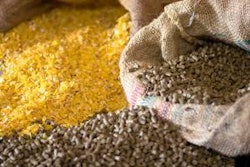Corn rose the most in 14 months and soybean futures jumped the most since 2011 as hot, dry Midwest weather threatens U.S. crop yields, according to reports.
Temperatures are expected to average as much as 14 degrees F above normal through the first week of September, with little rain in the Midwest. July and August will be the driest since 1936 in Iowa, Illinois and Indiana, according to T-Storm Weather LLC. Corn production is predicted to be 2.2 percent below the government August 12 forecast, while the soybean harvest will be 3 percent below forecast.
Corn futures for December delivery rose 6.5 percent to close at $5.005 a bushel at 1:15 p.m. on the Chicago Board of Trade on August 26, the biggest gain for a most-active contract since June 25, 2012. Earlier, the price touched $5.0825, the highest since July 16. Soybean futures for delivery in November jumped 4.6 percent to $13.895 a bushel on the CBOT on August 26, the biggest advance for a most-active contract since October 11, 2011. Earlier, the oilseed rose by the 70-cent exchange limit to $13.98. Prices rose 5.5 percent the week of August 19, the third straight increase.
The U.S. Department of Agriculture has cut its corn-crop forecast three times in as many months, predicting production of 13.763 billion bushels. While that would be a record, it is down from 14.14 billion bushels expected in May. On August 23, Iowa-based Pro Farmer predicted the crop would be 13.46 billion bushels. Soybean output may fall below the government’s estimate of 3.255 billion bushels, reaching 3.158 billion bushels, after planting delays and unusually cool, dry weather stunted growth, according to Pro Farmer.











